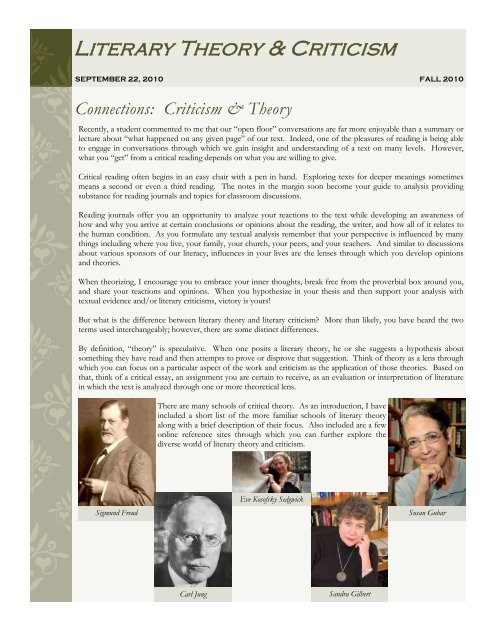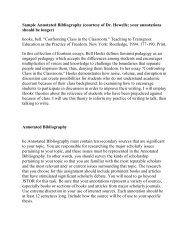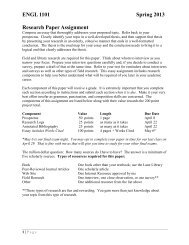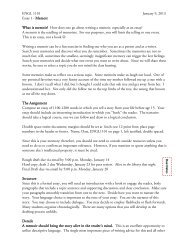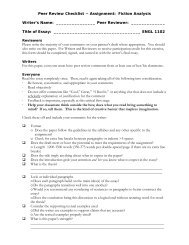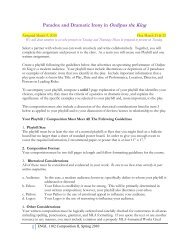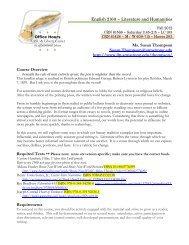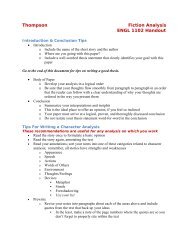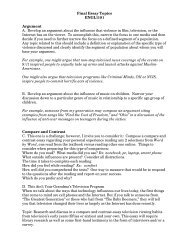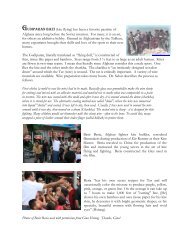Literary Theory & Criticism - Languages, Literature & Philosophy
Literary Theory & Criticism - Languages, Literature & Philosophy
Literary Theory & Criticism - Languages, Literature & Philosophy
You also want an ePaper? Increase the reach of your titles
YUMPU automatically turns print PDFs into web optimized ePapers that Google loves.
<strong>Literary</strong> <strong>Theory</strong> & <strong>Criticism</strong><br />
SEPTEMBER 22, 2010 FALL 2010<br />
Connections: <strong>Criticism</strong> & <strong>Theory</strong><br />
Recently, a student commented to me that our “open floor” conversations are far more enjoyable than a summary or<br />
lecture about “what happened on any given page” of our text. Indeed, one of the pleasures of reading is being able<br />
to engage in conversations through which we gain insight and understanding of a text on many levels. However,<br />
what you “get” from a critical reading depends on what you are willing to give.<br />
Critical reading often begins in an easy chair with a pen in hand. Exploring texts for deeper meanings sometimes<br />
means a second or even a third reading. The notes in the margin soon become your guide to analysis providing<br />
substance for reading journals and topics for classroom discussions.<br />
Reading journals offer you an opportunity to analyze your reactions to the text while developing an awareness of<br />
how and why you arrive at certain conclusions or opinions about the reading, the writer, and how all of it relates to<br />
the human condition. As you formulate any textual analysis remember that your perspective is influenced by many<br />
things including where you live, your family, your church, your peers, and your teachers. And similar to discussions<br />
about various sponsors of our literacy, influences in your lives are the lenses through which you develop opinions<br />
and theories.<br />
When theorizing, I encourage you to embrace your inner thoughts, break free from the proverbial box around you,<br />
and share your reactions and opinions. When you hypothesize in your thesis and then support your analysis with<br />
textual evidence and/or literary criticisms, victory is yours!<br />
But what is the difference between literary theory and literary criticism? More than likely, you have heard the two<br />
terms used interchangeably; however, there are some distinct differences.<br />
By definition, “theory” is speculative. When one posits a literary theory, he or she suggests a hypothesis about<br />
something they have read and then attempts to prove or disprove that suggestion. Think of theory as a lens through<br />
which you can focus on a particular aspect of the work and criticism as the application of those theories. Based on<br />
that, think of a critical essay, an assignment you are certain to receive, as an evaluation or interpretation of literature<br />
in which the text is analyzed through one or more theoretical lens.<br />
There are many schools of critical theory. As an introduction, I have<br />
included a short list of the more familiar schools of literary theory<br />
along with a brief description of their focus. Also included are a few<br />
online reference sites through which you can further explore the<br />
diverse world of literary theory and criticism.<br />
Sigmund Freud<br />
Eve Kosofsky Sedgwick<br />
Susan Gubar<br />
Carl Jung<br />
Sandra Gilbert
Schools of <strong>Literary</strong> <strong>Criticism</strong> ~ A Beginning<br />
This handout is your introduction to schools of literary theory and criticism. This list is not comprehensive nor are the brief explanations the only ways of<br />
distinguishing these areas of theory. It is important to remember that a critic may reference more than one school of criticism in his or her analysis.<br />
Formalism Considers the text without incorporating elements of the literary movement or author’s life, focusing on the formal<br />
elements of a work: its language, structure, tone, and literary devices like diction, irony, metaphor, paradox, symbols, plot,<br />
characterization, setting, or theme. How does it all connect and work together to create the author’s meaning?<br />
Psychoanalytic Explores the role of consciousnesses and the unconscious in literature including that of the author, reader, and<br />
characters in the text. Psychoanalytic <strong>Criticism</strong> builds on theories of psychology from several notable psychologists like Sigmund<br />
Freud. Related to this is Jungian <strong>Criticism</strong>, based on theories of Carl Jung, a student of Freud’s.<br />
Marxist Emphasizes themes of class conflict and explores social institutions represented in literature.<br />
These theories are partially informed by the philosophy of Karl Marx. Georg Lukács is credited as the<br />
founder of Western Marxism.<br />
Reader-Response Focuses upon the reader’s active response to a text and the relationship between<br />
the reader and the text; leading theorists include Stanley Fish, Wayne Booth, & Louis Rosenblatt.<br />
New Historicism and Cultural Studies Examines the work through its<br />
historical context and seeks to understand cultural and intellectual history<br />
through literature.<br />
Georg Lukács<br />
Post-Colonial Focuses on the influences colonialism and conflict resulting<br />
from the colonization and exploitation of less developed countries and its indigenous peoples by Western<br />
nations. Homi K. Bhabha is an important and influential post-colonial theorist.<br />
Feminist Focuses on representations of women through an examination of roles, relationships, and<br />
representations of power. Early feminist criticism focused on authorship and representations of women<br />
in literature. The two feminist scholars pictured on the front are Susan Gubar and Sandra Gilbert.<br />
Homi K. Bhabha<br />
Queer Studies Analyzes gender identity and sexuality in literature, specifically how gay & lesbian<br />
individuals are portrayed in literature, their responses to various works of literature, and how their portrayal/acceptance has<br />
changed over the years. Eve Kosofsky Sedgwick, pictured on the front, was a pioneer in gender and queer theory.<br />
A Few Online Resources to Explore<br />
Brizee, Allen J. and Case Tompkins. “<strong>Literary</strong> <strong>Theory</strong> and Schools of <strong>Criticism</strong>.” Purdue Online Writing Lab. 2010. Purdue<br />
University. September 22, 2010. http://owl.english.purdue.edu/owl/resource/722/01/. Web.<br />
“Carl Jung.” Encyclopedia of World Biography.” 2010. Avameg, Inc. September 21, 2010. http://<br />
www.notablebiographies.com/Jo-Ki/Jung-Carl.html. Web.<br />
Cohen, Patricia. “Lit Critics Who Peer Under the Covers.” The New York Times. April 18, 2009. The New York Times<br />
Company. September 21, 2010. http://www.nytimes.com/2009/04/19/weekinreview/19cohen.html?_r=1. Web.<br />
Felluga, Dino. "General Introduction to the Site." Introductory Guide to Critical <strong>Theory</strong>. November 28, 2003. Purdue University.<br />
September 16, 2010. www.purdue.edu/guidetotheory/introduction/. Web.<br />
“Rhetorical and Cultural Studies: Critical <strong>Theory</strong>.” Online Communications Studies Resources. The University of Iowa College of<br />
Liberal Arts & Sciences Department of Communication Studies. June 18, 2009. 091610. http://www.uiowa.edu/<br />
~commstud/resources/critical_authors.html. Web.<br />
“Voice of the Shuttle.” Gender and Sexuality. 2010. 091610. http://vos.ucsb.edu/browse.asp?id=2711. Web.<br />
Read.Write.Know<br />
Please support literacy initiatives in our communities.<br />
Supplement for ENGL1102 & ENGL2100<br />
Susan.Thompson@Armstrong.edu


